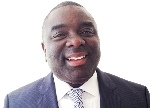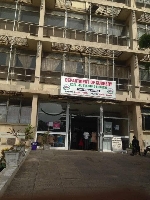Covid-19: Let's intensify education on sanitation, safety protocols for compliance – Oti Boateng
 Daasebre Professor (Emeritus) Oti Boateng
Daasebre Professor (Emeritus) Oti Boateng
Omanhene of New Juaben Daasebre Prof. (Emeritus) Oti Boateng has called on root-based institutions, traditional authorities, the district assemblies, sanitation service providers, faith-based organisations, ministries, departments, and agencies to immediately scale up health education on sanitation, hygiene, and Covid-19 safety protocols to ensure total compliance.
The latest call by the former President of Eastern Regional House of Chiefs comes at the period African Center for Health Policy, Research and Analysis are cautioning the public to strictly adhere to Covid-19 safety protocols to escape a third wave of the pandemic.
Speaking at Graphic/Zoomlion Stakeholders Dialogue on Sanitation at the Ghana Library Authority in Koforidua, Daasebre Oti Boateng said "With the appropriate community involvement, the long-term solution for the control of these diseases lies in economic development and universal access to safe drinking water and adequate sanitation. Such interventions also prevent a wide range of other water-borne illnesses, as well as contributing to achieving goals related to poverty, malnutrition, and education".
He noted that "the aforementioned disease profile and the catastrophic consequences of the coronavirus pandemic call for the initiation of coordinated efforts by all stakeholders - government, root-based institutions, traditional leaders, the district assemblies, sanitation service providers, faith-based organisations and others to mount serious periodic health education programmes on sanitation and general hygienic protocols. Such education should focus on the best hygienic practices by all households in eliminating all stagnant water in and around the house and workplaces, observing the best ways of dumping refuse, dislodging choked drains, and possibly embarking on fumigation in all communities. This preventive intervention will have an enormous impact on the sustainable development of the communities and the country as a whole".
According to Daasebre Oti Boateng "We must adopt practical programmes of continuing education that establish a clear connection between cleanliness and health and between a healthy environment and a peaceful and creative mind. We must enable people to see the immediate and long-term positive consequences of maintaining clean bodies, clean homes, clean shops, clean offices, clean places of worship, clean schools, clean environments everywhere they may be. When people’s perceptions change about dirt, their motivations and practices will change accordingly".
Daasebre Oti Boateng is of the view that 'Operation Clean Communities', a health and sanitation intervention will complement the government's efforts to prevent the spread of the infectious Covid-19 pandemic.
"Committed to keeping its communities clean and free from diseases, the New Juaben Traditional Council launched the ‘Operation Clean Communities’ on 11th March 2021 to complement the government’s effort to reduce the spread of COVID-19 and other communicable diseases in the traditional area", he noted.
Below is the full address delivered by Daasebre Oti Boateng in Koforidua on Friday, July 16, 2021.
DAASEBRE PROF. (EMERITUS) OTI BOATENG OMANHENE OF NEW JUABEN AND CHANCELLOR, ALL NATIONS UNIVERSITY.
Hon. Eastern Regional Minister, The Managing Director of Graphic Communications Group Limited, The Municipal Chief Executive, New Juaben South, The Editor, Daily Graphic, Nananom, Medical Superintendent, Regional Hospital, Koforidua, Representatives of Zoomlion, members of the media, distinguished invited guests, ladies and gentlemen, all protocols observed.
Let me thank the organisers of this critical dialogue for organising it and for the honour of inviting me as the Chairman.
I gratefully accept the offer with the following remarks: This morning’s dialogue with the theme “Keep Ghana Clean” is most appropriate and timely. Indeed, the ravaging effect of the ongoing global coronavirus pandemic exemplifies the universal truth that health and sanitation come first.
Health has two major components, the curative and the preventive, with sanitation and cleanliness falling into the preventive category.
But let me add that a clean environment is in and of itself enjoyable. In a patriotic quest to ascertain the relevant facts on the ground on the foregoing, theNew Juaben Traditional Council conducted in February 2020 the first-ever baseline survey on health in the Traditional Area under the Root-based global Model for development.
The findings, embodied in a new book titled ‘Implementing the Root-based Development’, encompass the basic development concerns of demographic information, benefits emanating from community engagement with stakeholders, economy and infrastructure, education, health and agriculture.
The survey results on health reveal that on the curative side, the dual health problems in New Juaben Traditional Area are inadequate medical doctors and paucity of medical infrastructure.
For example, nearly 52 per cent of the respondents indicated the non-availability of medical doctors while over 73 per cent indicated that the communities lack good hospitals.
Thus, the communities face serious health problems as complicated health issues, such as Dialysis, in the area would lead to frequent transportation of the patients to places where such advanced health facilities exist for treatment with concomitant escalating costs.
An examination of the disease profile of the communities further reveals that the four main diseases afflicting the communities in New Juaben were malaria, cholera, typhoid, and measles which together account for nearly 92 per cent of the total responses. These results suggest that effective sanitation and health control programs for the four major diseases will contribute significantly to the promotion of good health in the communities while simultaneously relieving the health sector of enormous pressures and conserving scarce foreign exchange for the nation at large.
Committed to keeping its communities clean and free from diseases, the New Juaben Traditional Council launched the “Operation Clean Communities” on 11th March 2021 to complement the government’s effort to reduce the spread of COVID-19 and other communicable diseases in the Traditional Area.
The initiative forms part of the Council’s community development efforts within the implementation strategy of the global Root-based development model (RBM). It is observed that “Operation Clean Communities” is akin to the theme: “Keep Ghana Clean” since keeping all communities in the country clean is synonymous with keeping Ghana clean.
As a Root-based development initiative, Operation Clean Communities is expected to help community members maintain and improve sanitation and well-being, prevent the spread of infectious diseases and upgrade their preparedness for natural disasters.
The program focuses on sanitation and the importance of leading a generally healthy lifestyle in order to protect the community as a whole. Thus, 'operation clean communities', is inextricably tied to individual wellness as the community constitutes the environment in which people live. It is therefore difficult to be healthy personally if your community and country are not clean and healthy.
The operation, which focuses on the preventive rather than the curative aspect of healthcare, is inspired by the universal dictum that prevention is better than cure. It thus involves the use of trained personnel in a comprehensive health education of households within the Traditional Area to assist in breaking the pathway of transmission of diseases afflicting the communities. The success or failure of any public health program is determined, to a large extent, by the public’s acceptance and proper use of the services offered.
That is why community involvement is considered to be an extremely crucial component for any optimal control programs of these diseases.
In spite of its importance, however, a plan to establish a high degree of community involvement often becomes an under-appreciated and neglected component of health control programmes.
With the appropriate community involvement, the long-term solution for the control of these diseases lies in economic development and universal access to safe drinking water and adequate sanitation. Such interventions also prevent a wide range of other waterborne illnesses, as well as contributing to achieving goals related to poverty, malnutrition, and education.
The aforementioned disease profile and the catastrophic consequences of the coronavirus pandemic call for the initiation of coordinated efforts by all stakeholders - government, root-based institutions, Traditional Leaders, the District Assemblies, Sanitation Service Providers, faith-based organisations and others to mount serious periodic health education programs on sanitation and general hygienic protocols. Such education should focus on the best hygienic practices by all households in eliminating all stagnant water in and around the house and workplaces, observing the best ways of dumping refuse, dislodging choked drains, and possibly embarking on fumigation in all communities. This preventive intervention will have enormous impact on the sustainable development of the communities and the country as a whole.
Distinguished guests, we must not divorce practices from perception. Thus I must again remind all of us about the importance of changing perceptions in our communities. What people perceive as good, as natural, as useful or as enjoyable affect how and what they do. The belief that individuals cannot do anything on their own to stop the cycle of dirt and diseases must be debunked.
We must adopt practical programs of continuing education that establish a clear connection between cleanliness and health and between a healthy environment and a peaceful and creative mind. We must enable people to see the immediate and long-term positive consequences of maintaining clean bodies, clean homes, clean shops, clean offices, clean places of worship, clean schools, clean environments everywhere they may be. When people’s perceptions change about dirt, their motivations and practices will change accordingly.
The Root-based global model offers a time-tested road map towards this community education and sensitisation program and were main committed to work with all stakeholders for a cleaner Ghana. It is my humble postulate that, although the Graphic/Zoomlion Stakeholder Dialogue is necessary and laudable, yet it is by no means sufficient.
The sufficiency criterion of getting and keeping the whole Ghana clean will be attained only if the critical mass of all communities and other stakeholders in Ghana get involved in a coordinated and sustained effort in keeping themselves and their environments clean. Such inclusive and sustained social intervention offers the best strategy to move Ghana rapidly beyond the stagnant and abysmal 15 per cent improved sanitation coverage to a more desirable and acceptable threshold.
Thank You.
Source: classfmonline.com
Trending News

CMG bombing: Take personal security seriously - Security expert tells workers
17:13
2024 polls: 'EC struggling to defend credibility' – Opoku-Agyemang says
23:02
US Army Major convicted for smuggling guns to Ghana
11:13
Absence of Foreign Fighters Act 'worrying' as more Ghanaian youth run to war zones and return as radicalised elements – CISA Ghana
15:05
I won't ever say I was a mere driver’s mate' – Opoku-Agyemang says
23:02
Ejisu by-election: 41-year-old man arrested for disrupting electoral process
10:49
Join me in another ‘dumsor’ vigil, I can’t do it alone – Yvonne Nelson tells Ghanaians
08:46
See the 4 arsonists who petrol-bombed Labone-based CMG
17:49
2024 polls: We're on victory path but not won yet – Asiedu Nketia warns NDC against complacency
23:03
Cancelled surgeries due to limited space at recovery ward not because of ‘dumsor’ – KBTH
08:16



